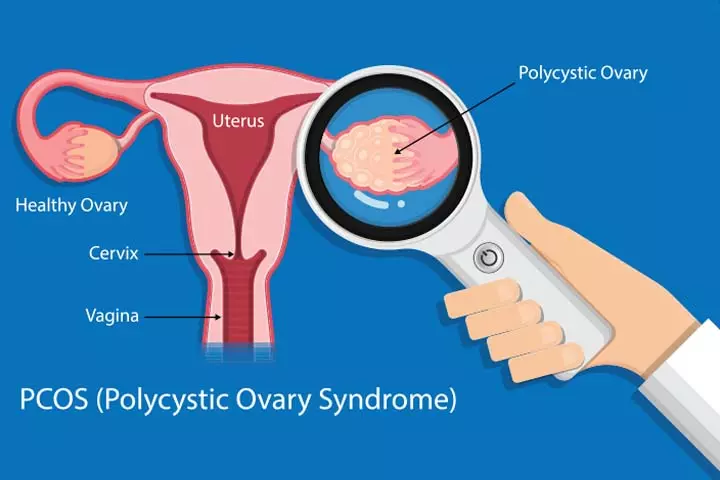
Image: iStock
Metformin or metformin hydrochloride is a prescription drug available as immediate-release or extended-release oral tablets for treating type 2 diabetes mellitusiA chronic disease resulting in high blood sugar levels because the body cannot use insulin properly . Consuming metformin while pregnant helps in glucose control. It considerably lowers blood glucose levels by improving the body’s response to naturally secreted insulin. It decreases the intestinal absorption of sugars from ingested food and controls the synthesis of sugars in the liver (1) (2).
The drug also has proven benefits in treating polycystic ovary syndrome (PCOS)i A condition where the female body produces increased male hormone resulting in multiple cysts on the ovaries in women of reproductive age and improving pregnancy outcomes (3). Continue reading this post to learn about the safety and efficacy of metformin during pregnancy.
Key Pointers
- Metformin is effective in controlling hyperglycemia and is considered safe during pregnancy.
- It may be used with other drugs for inducing ovulation in women with PCOS.
- Metformin therapy is not associated with any major congenital anomalies.
Is Metformin Safe During Pregnancy?

Image: Shutterstock
Metformin may be prescribed before or during pregnancy and is usually considered safe. Scientific studies have not suggested an increased incidence of any congenital anomaly with the use of this medication during pregnancy. The US Food and Drug Administration (FDA) ranks metformin in category B (animal reproduction studies have not demonstrated a fetal risk, and inadequate well-controlled studies have been conducted on pregnant women) (4).
How Does Metformin Help With Pregnancy?
Metformin may be prescribed by doctors when the body does not respond appropriately to the insulin hormone secreted by the pancreatic cells. This phenomenon is known as insulin resistance and is seen in type 2 diabetes mellitus and gestational diabetes (high blood glucose during pregnancy). The condition is also encountered in PCOS, a major cause of female infertility (5). Therefore, metformin may be beneficial before conception or during gestation in the following ways:
1. Fertility treatment of women with PCOS

Image: Shutterstock
PCOS is a common hormonal disorder (causing higher levels of male hormones) that negatively affects egg release from the ovary. Metformin alone or in combination with other medications can effectively induce ovulation, especially in non-obese women with PCOS. Additionally, metformin is considered useful in reducing the risk of ovarian hyperstimulation syndrome (painful swelling of the ovaries due to overstimulation) in women with PCOS undergoing in vitro fertilization (IVF) (6). Some studies also indicate that co-treatment with metformin may increase clinical pregnancy rates (7).
2. Treatment of gestational diabetes
Uncontrolled high blood glucose levels during pregnancy can negatively impact pregnancy. It may result in macrosomia, or a larger-sized baby, making a C-section necessary. The risk of miscarriage or stillbirths may also increase. Maternal complications may include high blood pressure, preeclampsia, and an increased risk of developing diabetes mellitus in the future (8). Though many doctors consider insulin the first-line treatment for gestational diabetes, current scientific evidence supports the safe use of metformin and dietary changes to control high blood sugar in pregnant women. Compared to insulin, metformin treatment has shown to cause less weight gain in pregnant women, and it is more patient compliant and cost-effective (4).
 Quick fact
Quick fact3. Treatment of pre-existing type 2 diabetes in pregnant women

Image: Shutterstock
Earlier, metformin was replaced with insulin when a woman with pre-existing type 2 diabetes got pregnant since doctors were unsure of its safety. However, several current studies show that metformin effectively controls hyperglycemiaiA technical term for high sugar levels in the blood during pregnancy. Additionally, pregnant women receiving combination therapy of metformin and insulin require less insulin compared to insulin treatment alone (9).
What Is The Metformin Dosage In Pregnancy?
The dosage of metformin during pregnancy is best ascertained by your doctor based on your health requirements. Metformin therapy for gestational diabetes usually begins with a dose of 500mg, which may be increased up to 2500mg, depending on how your body responds to it in terms of glycemic control and side effects (8). Physicians may also modify the dose depending on conditions such as pre-existing insulin resistance or PCOS, as well as your blood sugar level and overall health. Ongoing monitoring is important to determine the most appropriate and safe dosage for you and the baby.
Are There Side Effects Of Metformin?
The common side effects of metformin include (10) (11):
- Nausea and vomiting
- Stomach cramps
- Bloating
- Diarrhea
Some adverse effects that are rare but may have more severe outcomes are:
- Hypoglycemia or a sudden fall in blood glucose levels.
- Lactate build-up in the body, causing lactic acidosis. Pre-existing liver or kidney disorders increase its risk. Immediate medical attention is required in case of symptoms such as breathing troubles, shivering, fatigue, and muscle pain.
- Decreased vitamin B12 levels in the body due to long-term use.
If you experience such side effects of the medicine, seek prompt medical care to prevent any adverse effects on maternal health.
Metformin may be considered safe during pregnancy based on the research done on the drug’s safety during pregnancy. It does not seem to have any adverse effects on maternal health. Moreover, the available medical research does not establish a link between metformin consumption and other complications such as preterm birth, birth defects, or miscarriages.
 Quick tip
Quick tipWhat Are The Alternatives To Metformin In Pregnancy?
The following therapeutic agents may be used in cases where it is inappropriate to use metformin during pregnancy (8).
- The American Diabetes Association recommends insulin during pregnancy for treating gestational diabetes. It is the standard therapy for the condition when dietary changes and exercise are insufficient to manage elevated blood sugar levels.
- Among oral antihyperglycemic agents, glyburide may be used in doses of 2.5mg to 20mg.

Image: Shutterstock
Frequently Asked Questions
1. Does metformin affect babies?
Metformin can cross the placentaiA temporary organ that develops during pregnancy and provides the fetus with oxygen and nutrients and reach the growing fetus, but it has not been associated with the occurrence of congenital anomalies. Babies born to mothers on metformin may have a normal body weight and less risk of low blood sugar when compared to babies of insulin-treatment pregnancies (12).
2. Can metformin cause twin pregnancy?
Ovarian induction with combination therapy containing metformin as an agent may cause an increased incidence of twin or multiple pregnancies. However, further research is required to establish its prevalence (13).
3. Does metformin prevent miscarriage?
Metformin treatment may help reduce the prevalence of miscarriage in women with PCOS and diabetes (14) (15).
4. Does metformin cause weight loss in pregnancy?
No evidence suggests that metformin causes weight loss during pregnancy, but studies indicate that the medication may prevent weight gain in obese pregnant women (16).
5. Is it okay to take metformin with folic acid?
Yes, since metformin may reduce vitamin B12 and folic acid levels in your body, ask your doctor and take these as supplements if you are pregnant(18).
6. How quickly does metformin work during pregnancy?
Taking metformin orally may reduce blood sugar levels in one to two weeks though it may take up to two to three months to bring them under complete control(19). However, sufficient studies for pregnant women are not available. You may ask your doctor for more information.
7. Does metformin slow a baby’s growth?
Metformin affects fetal growth, and mothers who take this medication during pregnancy have babies with lower birth weights. However, further studies show that these babies experience accelerated growth after birth and have high BMI by mid-childhood. This puts them at risk of cardio-metabolic disease in the future. Therefore, further studies are needed to determine the exact effects of metformin on the prenatal and postnatal growth of babies(20).
8. Can I stop taking metformin during pregnancy?
You should start or stop any medication during pregnancy only after proper consultation with your doctor.
Metformin is FDA-approved only for treating type 2 diabetes mellitus. Its use for PCOS and gestational diabetes are off-label. PCOS causes insulin resistance, resulting in hyperinsulinemia. However, metformin normalizes insulin levels, decreasing the luteinizing hormone and androgen levels to improve the menstrual cycle (10). Consuming metformin while pregnant can help effectively control gestational diabetes, and its benefits outweigh the risks. However, the decision to start metformin therapy should be taken by your doctor.
Infographic: Benefits And Side Effects Of Metformin
Metformin is an antidiabetic medication found useful before and during pregnancy. It acts by reducing insulin resistance which is directly or indirectly associated with fertility issues and pregnancy complications. The infographic below enlists the various uses of Metformin and its side effects.

Illustration: Momjunction Design Team
Illustration: Metformin While Pregnant: Safety Dosage & Its Alternatives

Image: Dall·E/MomJunction Design Team
References
- Metformin Information.
https://www.fda.gov/drugs/postmarket-drug-safety-information-patients-and-providers/metformin-information - Metformin in pregnancy: study shows no safety concerns.
https://www.gov.uk/drug-safety-update/metformin-in-pregnancy-study-shows-no-safety-concerns - Nisha Nathan and Shannon D Sullivan; (2014); The utility of metformin therapy in reproductive-aged women with polycystic ovary syndrome (PCOS).
https://pubmed.ncbi.nlm.nih.gov/24720592/ - Robert S. Lindsay and Mary R. Loeken; (2017); Metformin use in pregnancy: promises and uncertainties.
https://www.ncbi.nlm.nih.gov/pmc/articles/PMC5552827/ - Diabetes and Polycystic Ovary Syndrome (PCOS).
https://www.cdc.gov/diabetes/risk-factors/pcos-polycystic-ovary-syndrome.html?CDC_AAref_Val=https://www.cdc.gov/diabetes/basics/pcos.html# - Neil P. Johnson; (2014); Metformin use in women with polycystic ovary syndrome.
https://www.ncbi.nlm.nih.gov/pmc/articles/PMC4200666/ - Hatem Abu Hashim; 2015; Twenty years of ovulation induction with metformin for PCOS; what is the best available evidence?
https://pubmed.ncbi.nlm.nih.gov/26656973/ - Bryan S. Quintanilla Rodriguez and Heba Mahdy; (2021); Gestational Diabetes.
https://www.ncbi.nlm.nih.gov/books/NBK545196/ - Thomas M. Polasek et al.; (2018); Metformin treatment of type 2 diabetes mellitus in pregnancy: update on safety and efficacy.
https://www.ncbi.nlm.nih.gov/pmc/articles/PMC5971402/ - Calette Corcoran and Tibb F. Jacobs; (2021); Metformin.
https://www.ncbi.nlm.nih.gov/books/NBK518983/ - Metformin.
https://www.healthdirect.gov.au/metformin - Taking metformin for gestational diabetes.
https://medsafe.govt.nz/consumers/educational-material/MetforminforGestationalDiabetes.pdf - Clare Boothroyd and Anusch Yazdani. Higher-order multiple pregnancy associated with metformin in women with polycystic ovary syndrome: two cases and review of the literature.
https://pubmed.ncbi.nlm.nih.gov/16412759/ - Mawahib A S Al-Biate; (2015); Effect of metformin on early pregnancy loss in women with polycystic ovary syndrome.
https://pubmed.ncbi.nlm.nih.gov/26166338/ - Steve Hyer et al.; (2018); Metformin in Pregnancy: Mechanisms and Clinical Applications.
https://www.ncbi.nlm.nih.gov/pmc/articles/PMC6073429/ - Valentina D’Ambrosio et al.; (2019); Metformin reduces maternal weight gain in obese pregnant women: A systematic review and meta-analysis of two randomized controlled trials.
https://pubmed.ncbi.nlm.nih.gov/30945418/ - FDA Drug Safety Communication: FDA revises warnings regarding use of the diabetes medicine metformin in certain patients with reduced kidney function.
https://www.fda.gov/drugs/drug-safety-and-availability/fda-drug-safety-communication-fda-revises-warnings-regarding-use-diabetes-medicine-metformin-certain - Metformin.
https://www.peacehealth.org/medical-topics/id/hn-1437003 - Metformin (Oral Route).
https://www.mayoclinic.org/drugs-supplements/metformin-oral-route/description/drg-20067074 - Jane L. Tarry-Adkins et al.; (2019); Neonatal, infant, and childhood growth following metformin versus insulin treatment for gestational diabetes: A systematic review and meta-analysis.
https://www.ncbi.nlm.nih.gov/pmc/articles/PMC6684046/
Community Experiences
Join the conversation and become a part of our nurturing community! Share your stories, experiences, and insights to connect with fellow parents.
Read full bio of Dr. Pamela Adhiambo Muga
Read full bio of Dr. Joyani Das
Read full bio of Rebecca Malachi
Read full bio of Reshmi Das

















